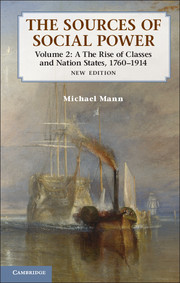Book contents
- Frontmatter
- Contents
- Preface to the new edition
- Preface
- 1 Introduction
- 2 Economic and ideological power relations
- 3 A theory of the modern state
- 4 The Industrial Revolution and old regime liberalism in Britain, 1760–1880
- 5 The American Revolution and the institutionalization of confederal capitalist liberalism
- 6 The French Revolution and the bourgeois nation
- 7 Conclusion to Chapters 4–6: The emergence of classes and nations
- 8 Geopolitics and international capitalism
- 9 Struggle over Germany: I. Prussia and authoritarian national capitalism
- 10 Struggle over Germany: II. Austria and confederal representation
- 11 The rise of the modern state: I. Quantitative data
- 12 The rise of the modern state: II. The autonomy of military power
- 13 The rise of the modern state: III. Bureaucratization
- 14 The rise of the modern state: IV. The expansion of civilian scope
- 15 The resistible rise of the British working class, 1815–1880
- 16 The middle-class nation
- 17 Class struggle in the Second Industrial Revolution, 1880–1914: I. Great Britain
- 18 Class struggle in the Second Industrial Revolution, 1880–1914: II. Comparative analysis of working-class movements
- 19 Class struggle in the Second Industrial Revolution, 1880–1914: III. The peasantry
- 20 Theoretical conclusions: Classes, states, nations, and the sources of social power
- 21 Empirical culmination – over the top: Geopolitics, class struggle, and World War I
- Appendix: Additional tables on state finances and state employment
- Index
- References
7 - Conclusion to Chapters 4–6: The emergence of classes and nations
Published online by Cambridge University Press: 05 July 2013
- Frontmatter
- Contents
- Preface to the new edition
- Preface
- 1 Introduction
- 2 Economic and ideological power relations
- 3 A theory of the modern state
- 4 The Industrial Revolution and old regime liberalism in Britain, 1760–1880
- 5 The American Revolution and the institutionalization of confederal capitalist liberalism
- 6 The French Revolution and the bourgeois nation
- 7 Conclusion to Chapters 4–6: The emergence of classes and nations
- 8 Geopolitics and international capitalism
- 9 Struggle over Germany: I. Prussia and authoritarian national capitalism
- 10 Struggle over Germany: II. Austria and confederal representation
- 11 The rise of the modern state: I. Quantitative data
- 12 The rise of the modern state: II. The autonomy of military power
- 13 The rise of the modern state: III. Bureaucratization
- 14 The rise of the modern state: IV. The expansion of civilian scope
- 15 The resistible rise of the British working class, 1815–1880
- 16 The middle-class nation
- 17 Class struggle in the Second Industrial Revolution, 1880–1914: I. Great Britain
- 18 Class struggle in the Second Industrial Revolution, 1880–1914: II. Comparative analysis of working-class movements
- 19 Class struggle in the Second Industrial Revolution, 1880–1914: III. The peasantry
- 20 Theoretical conclusions: Classes, states, nations, and the sources of social power
- 21 Empirical culmination – over the top: Geopolitics, class struggle, and World War I
- Appendix: Additional tables on state finances and state employment
- Index
- References
Summary
Many have hailed the half century beginning in 1770 as a revolutionary epoch in both Europe and the Americas. Some identify this with class and democracy – the “era of democratic revolutions” is Palmer's (1959) label – others with the revolutionary rise of nations across the two continents (Anderson 1983). Some countries did move toward nationalism and democracy; but most revolutions did not succeed, the French Revolution remained incomplete and the American was only ambiguously revolutionary. Moveover, these events inspired other regimes to avoid revolution by compromising with rising classes and nations. Their compromises proved of world-historical significance, for they were institutionalized in enduring forms. This chapter sums up what proved to be the main creative phase of modern Western history. The four greatest modern state crystallizations – capitalism, militarism, representation, and the national issue – were institutionalized together. And far from being opposites, classes and nations rose together, structured by all four sources of social power; and though rival segmental and local-regional organizations were diminished, they survived, transformed.
To explain all this, I start from the three power revolutions of the period. First, the economic revolution turned more on capitalism than on industrialism. Only in Britain (and lesser regions of Europe) did industrialization occur now, yet British distributive power changes were no greater than elsewhere. Chapter 4 shows how British industrialism was molded by a commercial capitalism that was already institutionalized. In this period industrialization greatly enhanced collective and geopolitical power only in Britain.
- Type
- Chapter
- Information
- The Sources of Social Power , pp. 214 - 253Publisher: Cambridge University PressPrint publication year: 2012



